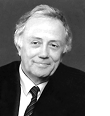Maintaining a balanced organism appears to run counter to living in modern societies
Maintaining a balanced organism appears to run counter to living in modern societies
 George Vithoulkas
introduced classical homeopathy to Greece. ‘Homeopathy is and always will be
accepted only by those secluded and sensitive souls who still believe in an
ideal world which most probably will never come,’ he said.
George Vithoulkas
introduced classical homeopathy to Greece. ‘Homeopathy is and always will be
accepted only by those secluded and sensitive souls who still believe in an
ideal world which most probably will never come,’ he said.
By George Vithoulkas
Can homeopathy, a non-violent system of medicine, survive in our contemporary violent world? This question is an important one and has been occupying my thoughts for many years. The reply to this question is vital to myself and to the students who have studied this form of medicine. The experience gathered over 40 years of efforts shows that although we have demonstrated the possibilities of this treatment to thousands of patients and doctors, we apparently have a long way to go before we can see homeopathy taking its rightful place as a specialization within the established medical world.
The crucial question is: Can homeopathy ever take its deserved place in a world that is full of everyday violence?
Homeopathy is a therapeutic system which is aimed at bringing about the psychosomatic equilibrium of the organism. Let us suppose that a patient with anxiety, depression, insecurity, irritation, a troubled psychotic mind, with many physical discomforts and pains, finds his way to homeopathy. For a certain period of time his health is restored and he feels a general sense of equilibrium and well-being. How long can this sense of psychosomatic well-being last within a violent and competitive society that requires extreme efforts on the part of the individual, who may sometimes reach the unbelievable situation which makes one think, “If I don’t eliminate him, he will kill me”? Not very long really. The loss of balance again is inevitable.
Modern societies push people into ever more violent types of behavior, and promote new models for survival that eventually become the accepted norm. It has become the usual practice to grab things under any circumstances, even “over dead bodies.” The idea of meritocracy has been eliminated and the usurpation of power by whatever means is a daily practice. Those who work toward their spiritual evolution or the “sensitization of their conscience,” refusing to trample on it, are increasingly in the minority. They either live a secluded existence or find themselves almost automatically marginalized by society. However it is they who, perhaps unwittingly, continue to support the planet’s positive forces, so that societies will be prevented from sliding toward complete destruction. These individuals nevertheless feel weak and isolated within our super-modern societies.
Violence in all its forms, whether practiced by one nation against another, by a state against its citizens, by terrorists against innocent people, by anyone with some power suppressing smaller groups or individuals, but mainly the subtle violence emerging from the financially powerful against the poor, is the experience of everyone today. In such societies is it possible for a system like homeopathy, which is non-violent medicine par excellence to grow and spread? It is clear from the outset that the two situations – maintaining a balanced organism and living in our modern societies – are in opposition. An organism cannot be kept in a state of psychosomatic equilibrium in a society that requires its members to trample on their consciences in order to survive. Such an organism can only be kept in balance if it has incredible powers of resistance, such as those with which only moral giants or heroes are endowed.
It can readily be concluded that homeopathy is not a therapeutic system adapted to modern societies and can never be applied in a mass way, so it is doubtful if it will ever be accepted by the medical establishment. That is why conventional medicine has nothing to fear from the spread and development of this therapeutic modality. Homeopathy is and always will be accepted only by those “secluded” and “sensitive” souls who still believe in an ideal world which most probably will never come.
Will there ever be room within the medical arena for such a “mild” therapeutic modality to be officially and globally accepted? Only if we could stop violating our conscience daily. If we suppose that a prophet would rise up today and announce to the world that in order to overcome violence we must all join forces to resist destruction through non-violent means, what do you think the most probable outcome would be? We would kill the prophet.